François de La Rochefoucauld Quotes
Most popular François de La Rochefoucauld Quotes

The world more often rewards the appearances of merit than merit itself.

Few men know how to be old.

We pardon as long as we love.

We have more power than will.

We never praise except for profit.

We always like those who admire us.
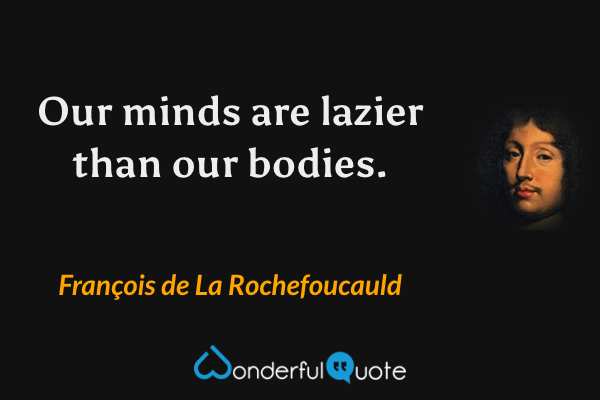
Our minds are lazier than our bodies.

One gives nothing so freely as advice.

Generally we praise only to be praised.

Men of weak character cannot be sincere.
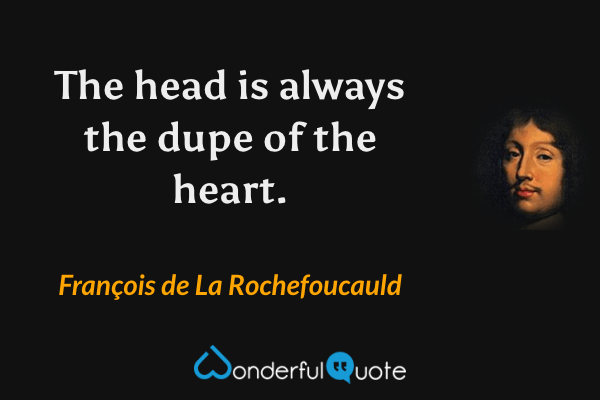
The head is always the dupe of the heart.
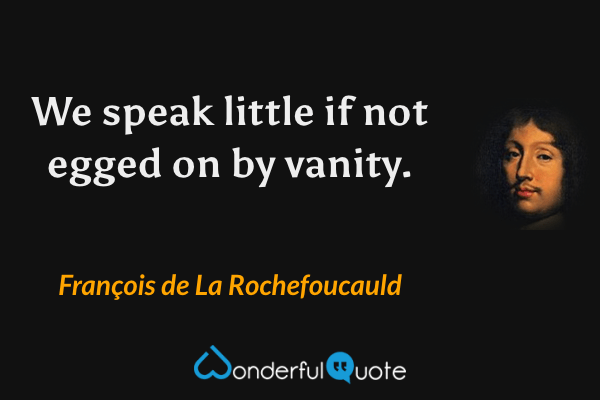
We speak little if not egged on by vanity.

One forgives to the degree that one loves.

We seldom praise except to get praise back.

There are heroes in evil as well as of good.
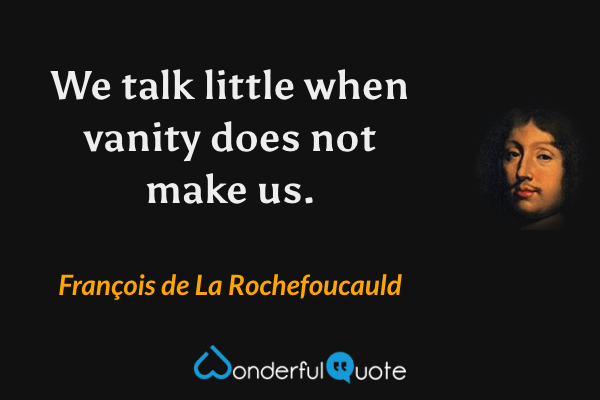
We talk little when vanity does not make us.

Self-love is the greatest of all flatterers.

It is far easier to know men than to know man.

Love's great miracle is the curing of coquetry.

We are never so generous as when giving advice.

We may give advice but we do not inspire conduct.

Wisdom is to the soul what health is to the body.

In jealousy there is more of self-love than love.

Wisdom is to the mind what health is to the body.

We may give advice, but we cannot inspire conduct.

Refusal of praise is a desire to be praised twice.

Hypocrisy is the homage which vice pays to virtue.

Hypocrisy is the tribute which vice pays to virtue.

Men give away nothing so liberally as their advice.

We are never so happy nor so unhappy as we imagine.

The refusal of praise is a wish to be praised twice.
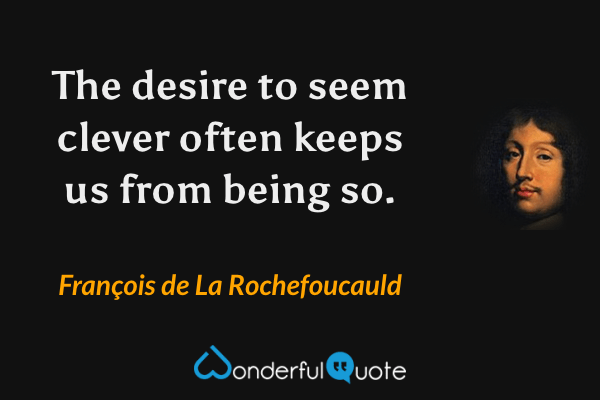
The desire to seem clever often keeps us from being so.

It is easier to be wise for others than for one's self.
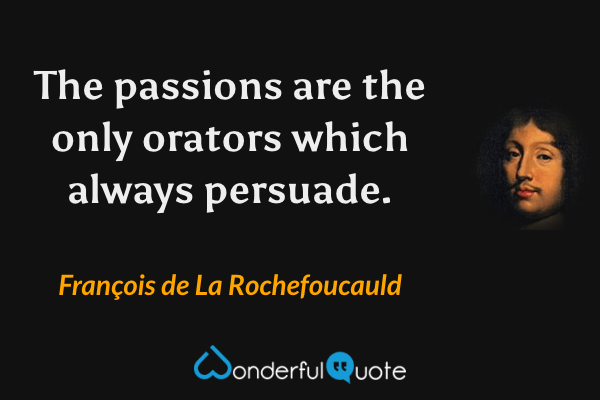
The passions are the only orators which always persuade.

The virtues and vices are all put in motion by interest.
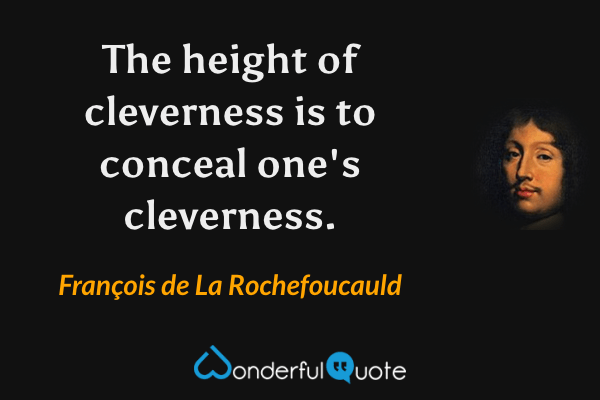
The height of cleverness is to conceal one's cleverness.

It's a great talent to be able to conceal one's talents.

One is never fortunate or as unfortunate as one imagines.

We try to make a virtue of vices we are loath to correct.
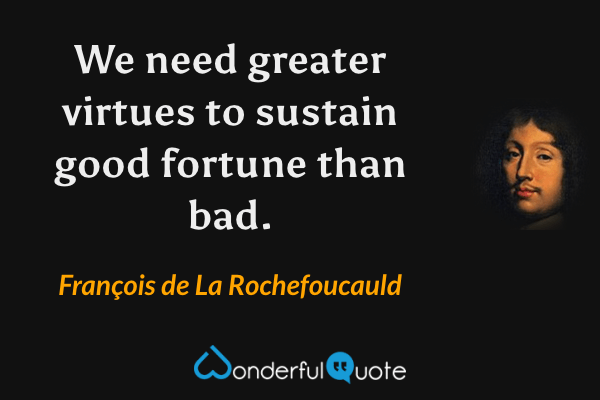
We need greater virtues to sustain good fortune than bad.

It is more easy to be wise for others than for ourselves.

All who know their own minds do not know their own hearts.

It is a great ability to be able to conceal one's ability.
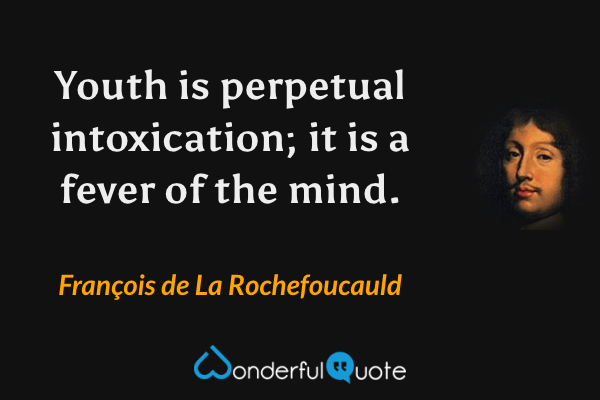
Youth is perpetual intoxication; it is a fever of the mind.

A good grace is to the body what good sense is to the mind.
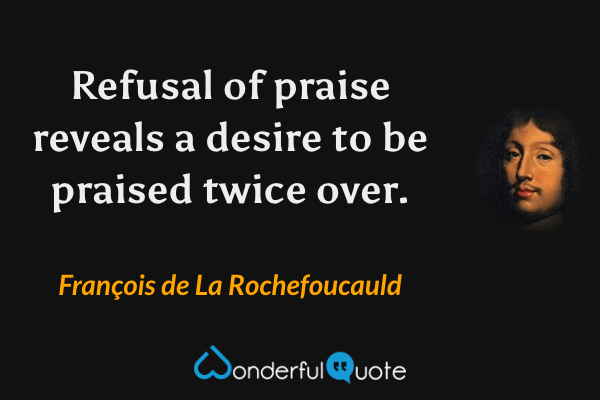
Refusal of praise reveals a desire to be praised twice over.
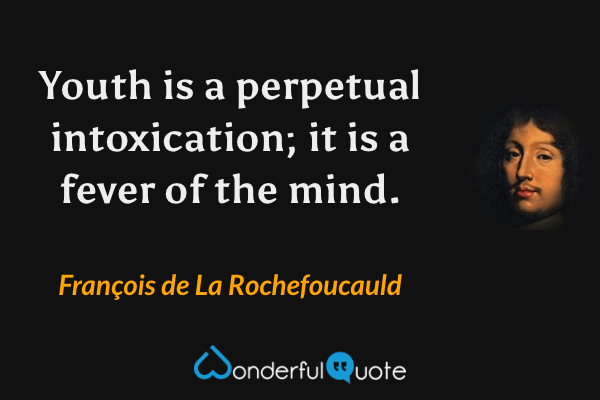
Youth is a perpetual intoxication; it is a fever of the mind.
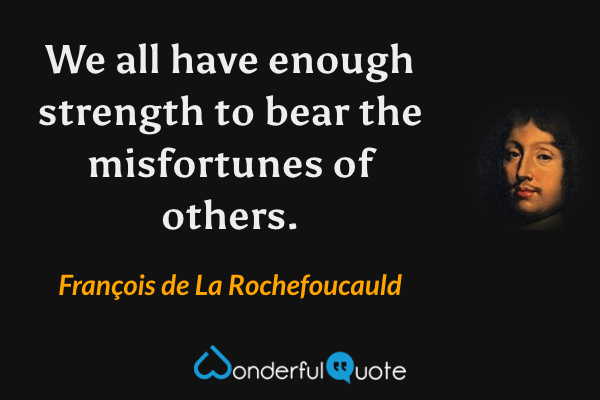
We all have enough strength to bear the misfortunes of others.

No one can prove his courage when he has never been in danger.

A man does not please long when he has only one species of wit.
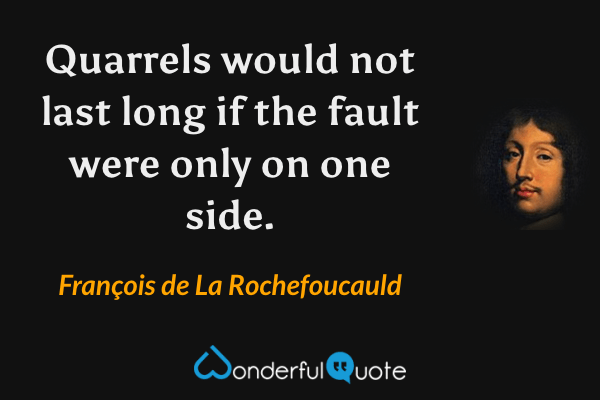
Quarrels would not last long if the fault were only on one side.
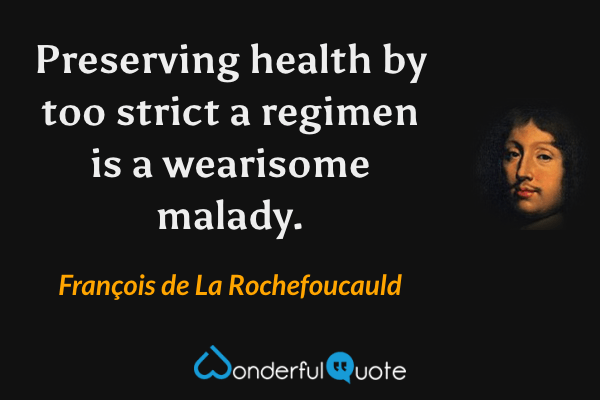
Preserving health by too strict a regimen is a wearisome malady.
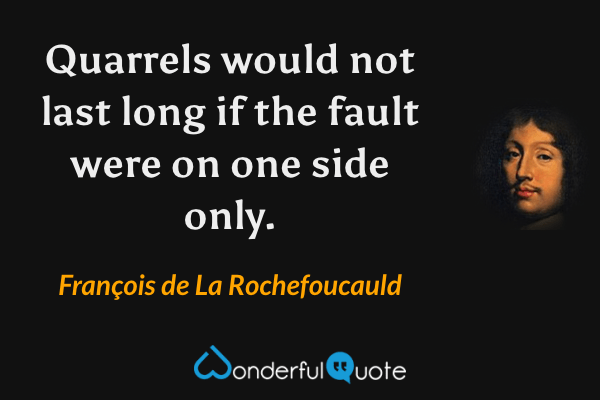
Quarrels would not last long if the fault were on one side only.

The greatest fault of a penetrating wit is to go beyond the mark.

When our vices leave us, we flatter ourselves that we leave them.

We can never be certain of our courage till we have faced danger.

Plenty of people despise money, but few know how to give it away.

Weakness of character is the only defect which cannot be amended.

When our hatred is too keen it puts us beneath those whom we hate.

Most men judge others only by their success or their good fortune.

We hardly find any men of good sense save those who agree with us.

Jealousy is always born with love but does not always die with it.

Fortune never appears so blind as to those to whom she does no good.

Ability wins us the esteem of the true men; luck that of the people.
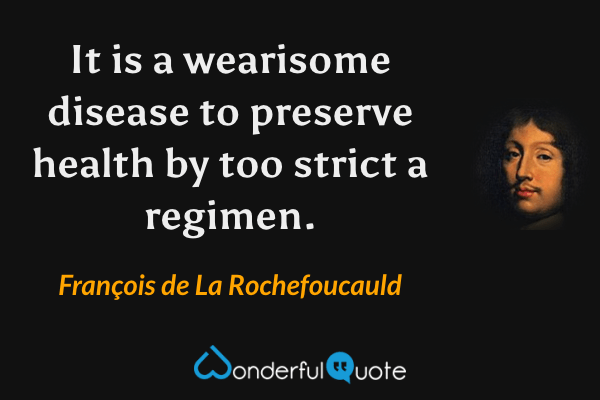
It is a wearisome disease to preserve health by too strict a regimen.

Too great haste in paying off an obligation is a kind of ingratitude.

Virtue would not go nearly so far if vanity did not keep her company.

To succeed in the world, we do everything we can to appear successful.

The trust which we put in ourselves causes us to feel trust in others.
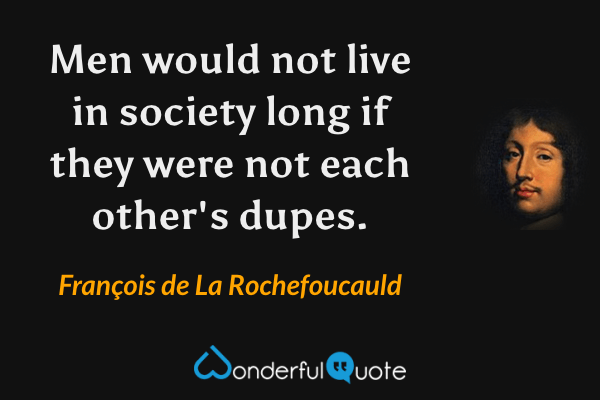
Men would not live in society long if they were not each other's dupes.

Everyone complains of his memory, and no one complains of his judgment.

To be a great man it is necessary to turn to account all opportunities.

We think very few people sensible, except those who are of our opinion.

Everyone complains of his memory, but no one complains of his judgment.

Everyone complains of his memory, and nobody complains of his judgment.

True love is like ghosts, which everyone talks about and few have seen.
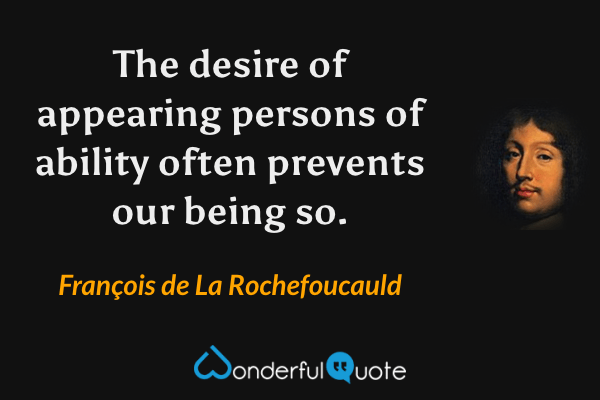
The desire of appearing persons of ability often prevents our being so.

Silence is the safest course for any man to adopt who distrusts himself.

True love is like ghosts, which everybody talks about and few have seen.

It is easier to be wise on behalf of others than to be so for ourselves.

If vanity does not overthrow all virtues, at least she makes them totter.

Nothing so much prevents our being natural as the desire of appearing so.

Nothing prevents us from being natural so much as the desire to appear so.

A man who finds no satisfaction in himself seeks for it in vain elsewhere.

A man of wit would often be at a loss were it not for the company of fools.
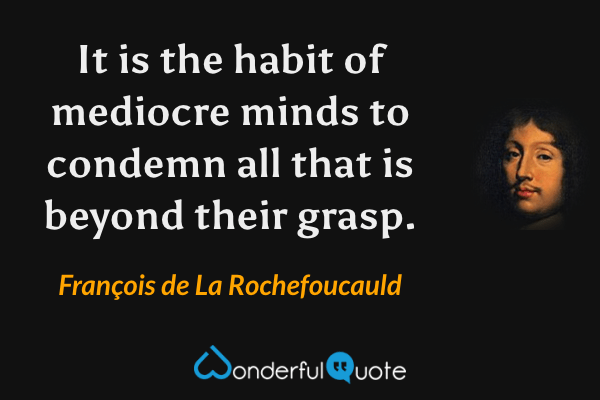
It is the habit of mediocre minds to condemn all that is beyond their grasp.

No disguise can long conceal love where it is, nor feign it where it is not.

There are people enough who despise money, but few who know how to bestow it.

We often forgive those who bore us, but we cannot forgive those whom we bore.

Men too involved in details usually become unable to deal with great matters.
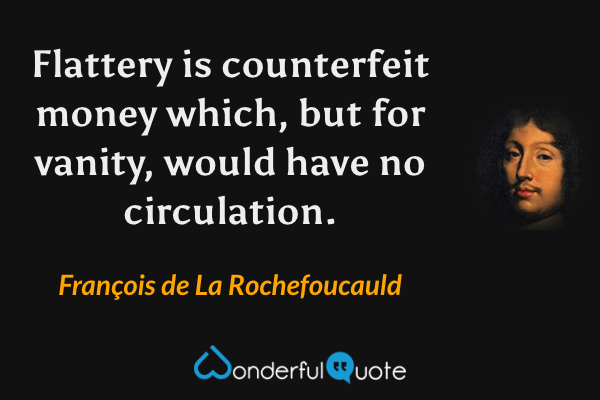
Flattery is counterfeit money which, but for vanity, would have no circulation.

It is much easier to suppress a first desire than to satisfy those that follow.

We always love those who admire us; we do not always love those whom we admire.

When we do not find peace within ourselves, it is vain to seek for it elsewhere.
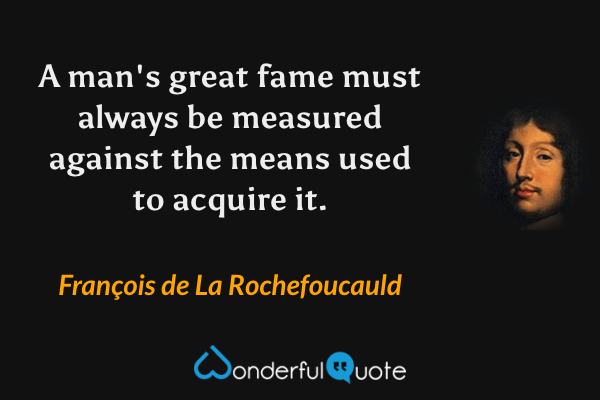
A man's great fame must always be measured against the means used to acquire it.
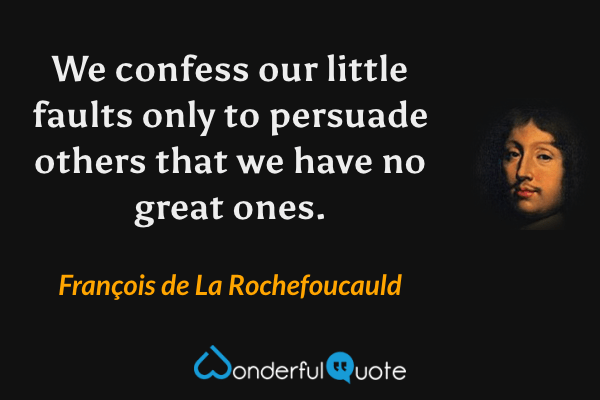
We confess our little faults only to persuade others that we have no great ones.

The gratitude of most men is merely a secret desire to receive greater benefits.

Hope and fear go arm in arm: there is no fear without hope, no hope without fear.

Great names abase, instead of elevating, those who do not know how to bear them.

Commonplace minds usually condemn what is beyond the reach of their understanding.

Loyalty is in most people only a ruse used by self-interest to attract confidence.
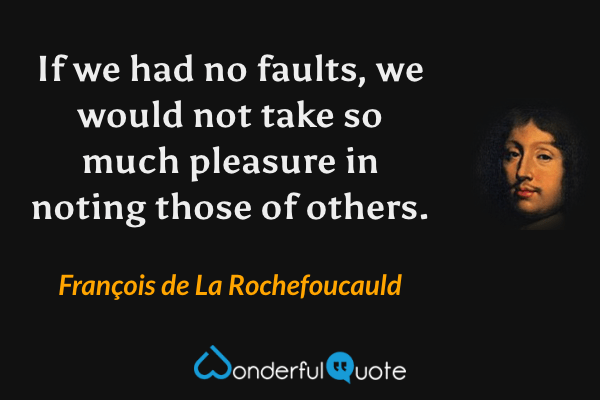
If we had no faults, we would not take so much pleasure in noting those of others.

We torment ourselves rather to make it appear that we are happy than to become so.
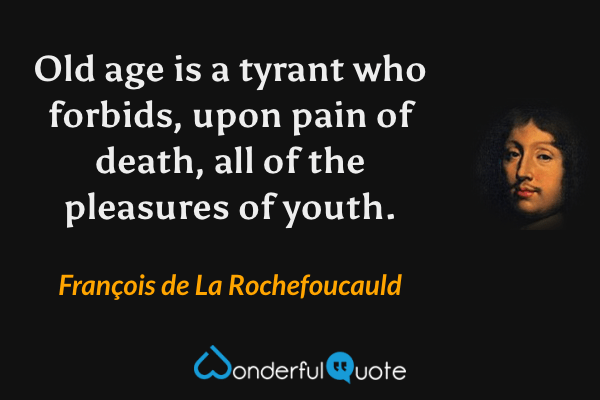
Old age is a tyrant who forbids, upon pain of death, all of the pleasures of youth.

One often goes from love to ambition, but one rarely returns from ambition to love.

Men would not live long in social contact unless they were deceived by one another.

If we judge of love by its usual effects, it resembles hatred more than friendship.

Flattery is like counterfeit money which, but for vanity, would have no circulation.

We would often be ashamed of our finest actions if the world understood our motives.
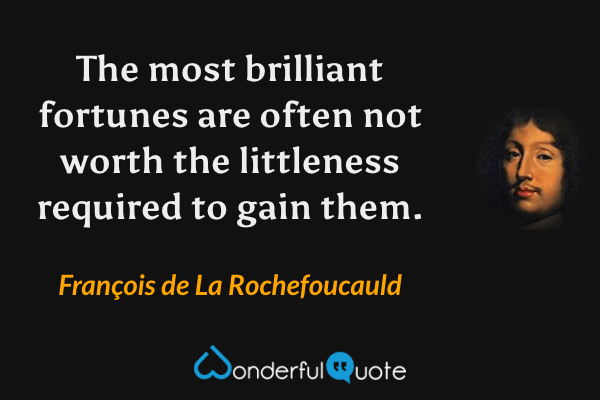
The most brilliant fortunes are often not worth the littleness required to gain them.

We often pass from love to ambition, but we hardly ever return from ambition to love.

A man's happiness or unhappiness depends as much on his temperament as on his destiny.

The love of justice is, in most men, nothing more than the fear of suffering injustice.
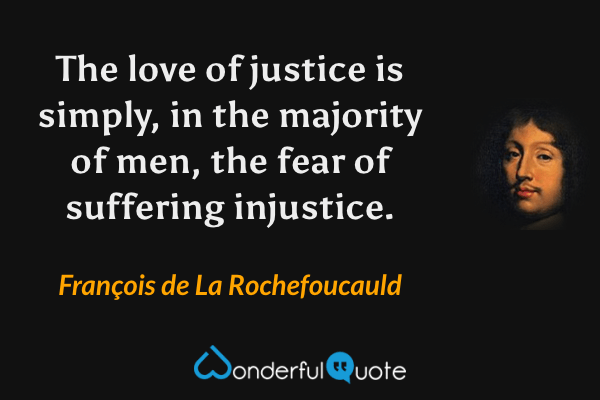
The love of justice is simply, in the majority of men, the fear of suffering injustice.

To safeguard one's health at the cost of too strict a diet is a tiresome illness indeed.
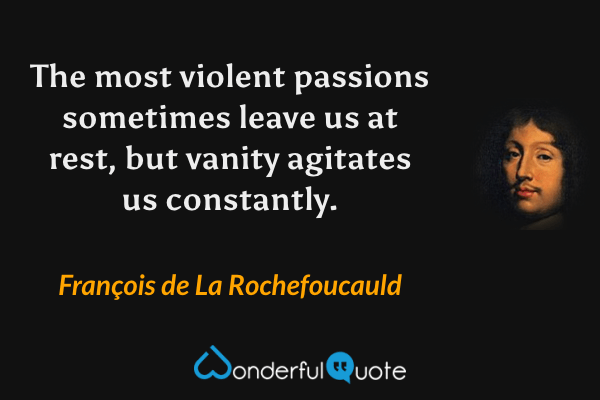
The most violent passions sometimes leave us at rest, but vanity agitates us constantly.
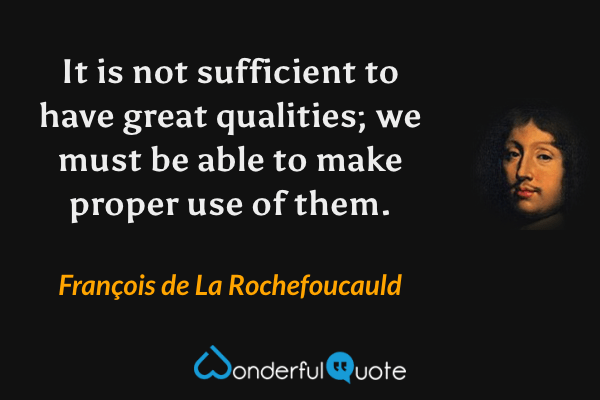
It is not sufficient to have great qualities; we must be able to make proper use of them.
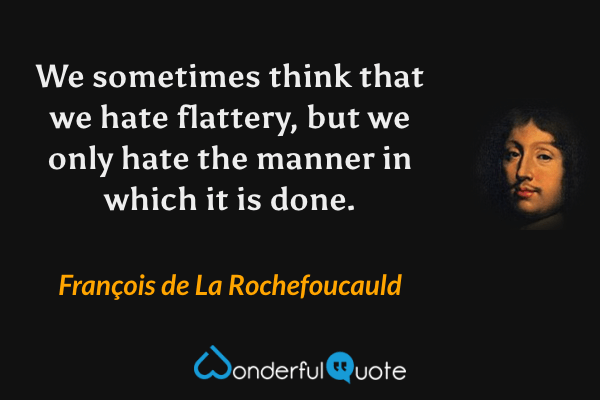
We sometimes think that we hate flattery, but we only hate the manner in which it is done.
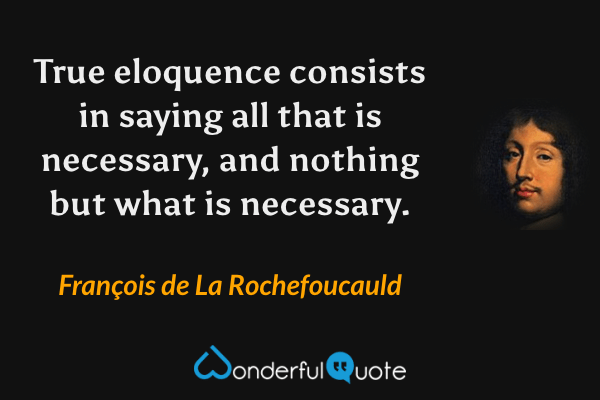
True eloquence consists in saying all that is necessary, and nothing but what is necessary.

The glory of great men should always be measured by the means they have used to acquire it.
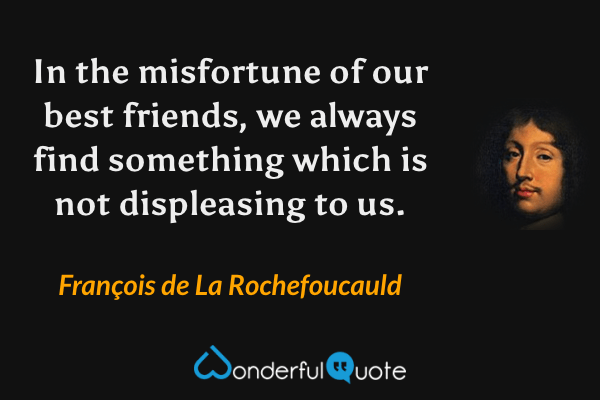
In the misfortune of our best friends, we always find something which is not displeasing to us.
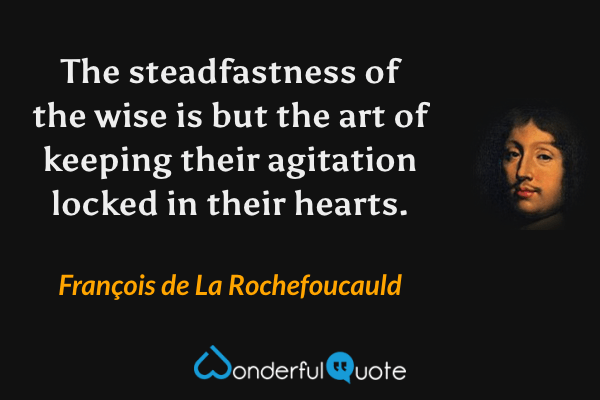
The steadfastness of the wise is but the art of keeping their agitation locked in their hearts.
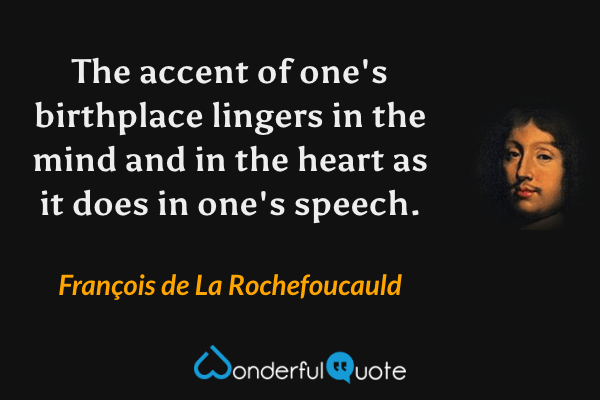
The accent of one's birthplace lingers in the mind and in the heart as it does in one's speech.

Philosophy triumphs easily over past evils and future evils; but present evils triumph over it.
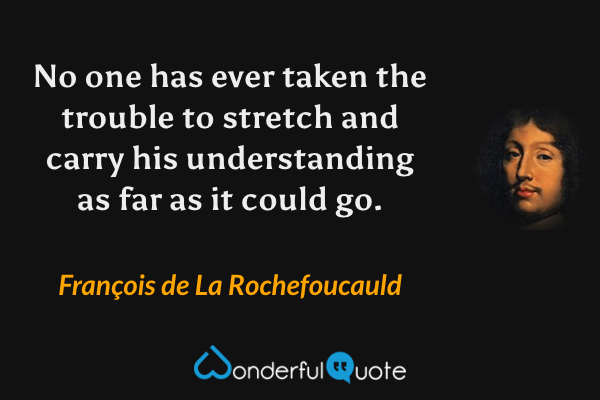
No one has ever taken the trouble to stretch and carry his understanding as far as it could go.
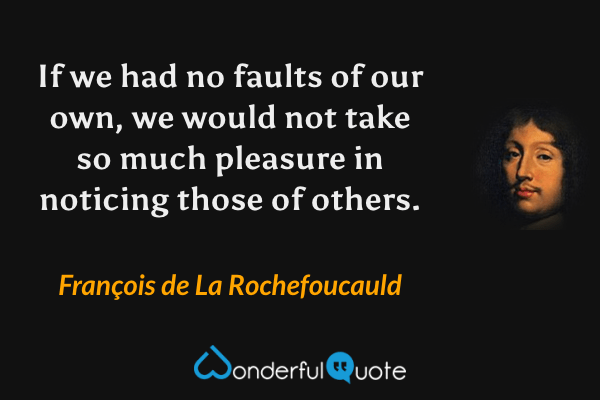
If we had no faults of our own, we would not take so much pleasure in noticing those of others.

The accent of a man's native country remains in his mind and his heart, as it does in his speech.
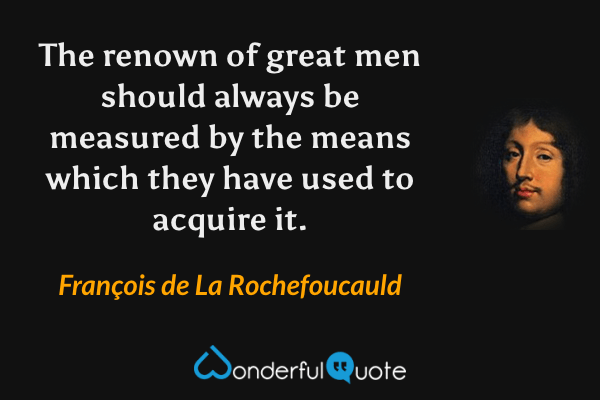
The renown of great men should always be measured by the means which they have used to acquire it.

Hope, deceitful as it is, serves at least to lead us to the end of our lives by an agreeable route.

Hope, deceiving as it is, serves at least to lead us to the end of our lives by an agreeable route.
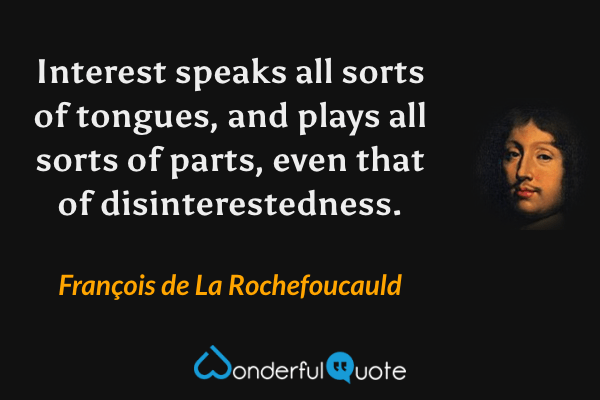
Interest speaks all sorts of tongues, and plays all sorts of parts, even that of disinterestedness.

Before strongly desiring anything, we should look carefully into the happiness of its present owner.

True love is like a psychic experience. Everyone tells ghost stories, but few have ever seen a ghost.

The reason why lovers are never weary of one another is this — they are always talking of themselves.

Smallness of mind is the cause of stubbornness, and we do not credit readily what is beyond our view.

There is no disguise which can for long conceal love where it exists or simulate it where it does not.

Old men are fond of giving good advice to console themselves for their inability to give bad examples.

The pleasure of love is in loving; we are happier in the passion we feel than in the passion we inspire.

Perfect courage is to do without witnesses what one would be capable of doing with the world looking on.

It is as easy to deceive ourselves without noticing as it is hard to deceive others without their noticing.

What is called generosity is usually only the vanity of giving; we enjoy the vanity more than the thing given.

Old men are fond of giving advice to console themselves for being no longer in a position to give bad examples.

We should often feel ashamed of our best actions if the world could see all of the motives which produced them.
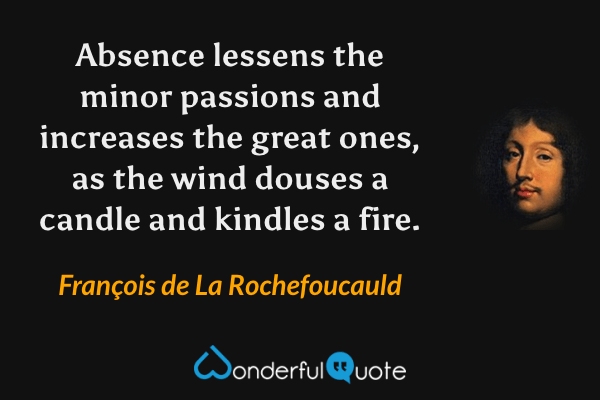
Absence lessens the minor passions and increases the great ones, as the wind douses a candle and kindles a fire.
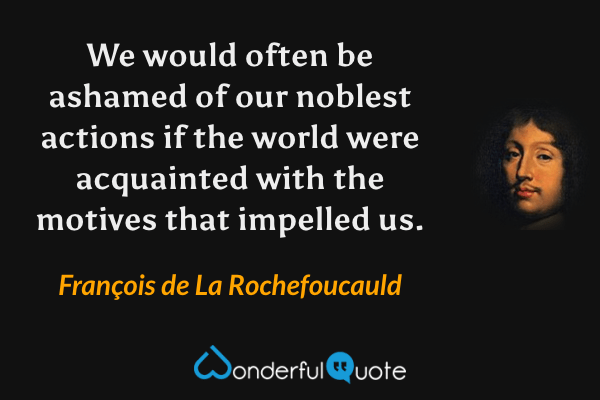
We would often be ashamed of our noblest actions if the world were acquainted with the motives that impelled us.

Old men delight in giving good advice as a consolation for the fact that they can no longer provide bad examples.

Sometimes accidents happen in life from which we have need of a little madness to extricate ourselves successfully.
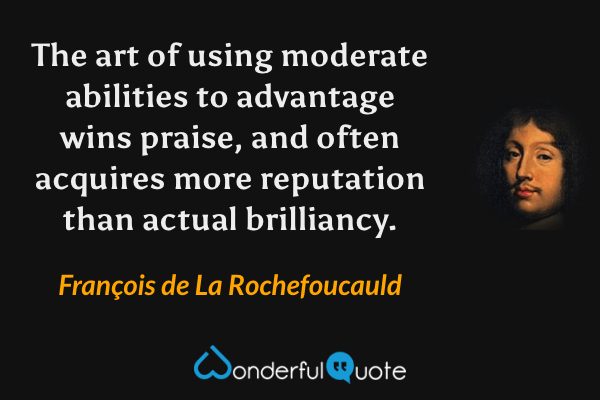
The art of using moderate abilities to advantage wins praise, and often acquires more reputation than actual brilliancy.

As it is the characteristic of great wits to say much in few words, so it is of small wits to talk much and say nothing.
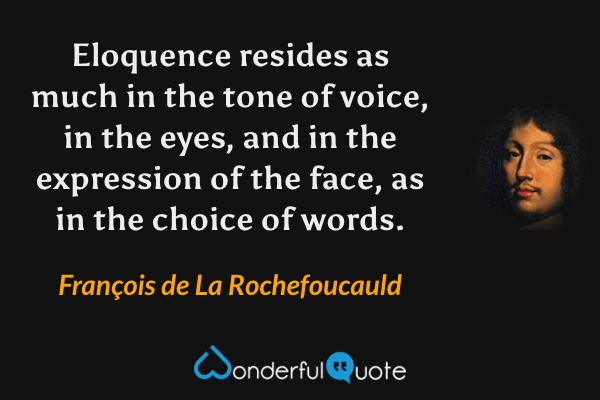
Eloquence resides as much in the tone of voice, in the eyes, and in the expression of the face, as in the choice of words.
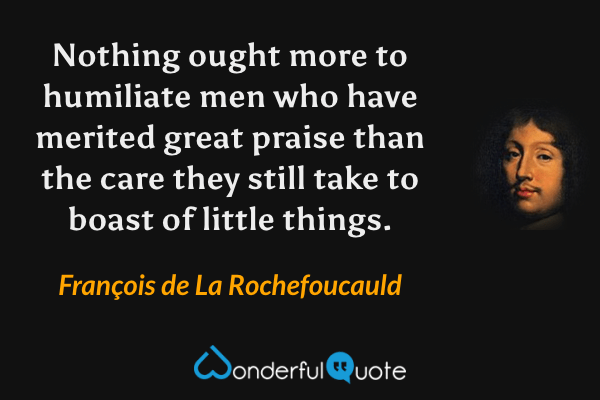
Nothing ought more to humiliate men who have merited great praise than the care they still take to boast of little things.

Few things are impracticable in themselves, and it is for want of application, rather than of means, that men fail of success.
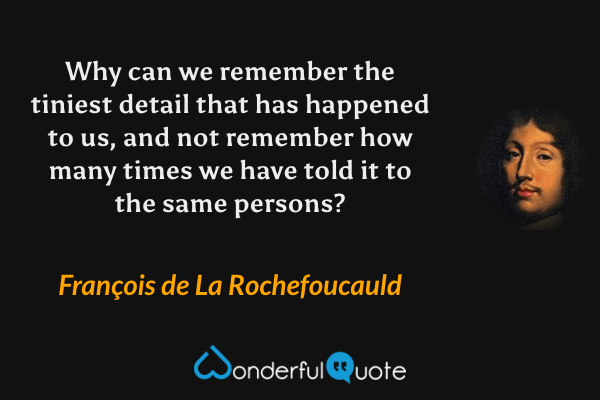
Why can we remember the tiniest detail that has happened to us, and not remember how many times we have told it to the same persons?

We often pride ourselves on even the most criminal passions, but envy is a timid and shame-faced passion we never dare acknowledge.
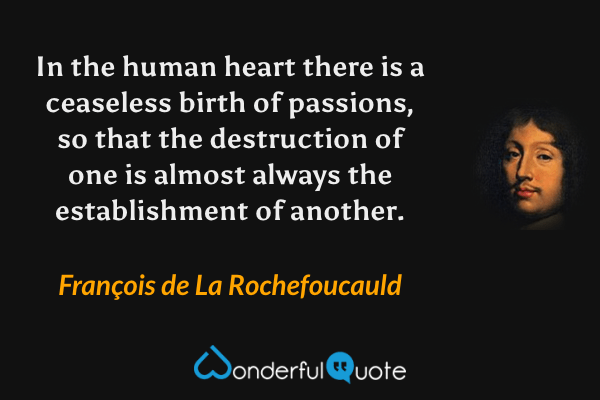
In the human heart there is a ceaseless birth of passions, so that the destruction of one is almost always the establishment of another.

Folly pursues us throughout our lives, and the man whom we call wise is he whose follies are proportionate to his age and to his fortune.

He who imagines he can do without the world deceives himself much; but he who fancies the world cannot do without him is still more mistaken.
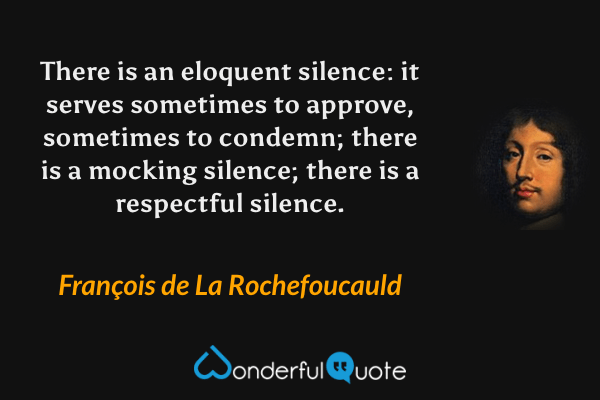
There is an eloquent silence: it serves sometimes to approve, sometimes to condemn; there is a mocking silence; there is a respectful silence.

Humility is often only a feigned submissiveness by which men hope to bring other people to submit to them; it is a more calculated sort of pride.

True bravery is shown by performing... True bravery is shown by performing without witness what one might be capable of doing before all the world.

The reason why so few people are agreeable in conversation is that each is thinking more about what he intends to say than about what the other is saying.

What men call friendship is no more than a partnership, a mutual care of interests, an exchange of favors – in a word, it is a sort of traffic, in which self-love ever proposes to be the gainer.

Complete courage and absolute cowardice are extremes that very few men fall into. The vast middle space contains all the intermediate kinds and degrees of courage; and these differ as much from one another as men's faces or their humors do.
When our hatred is too keen, it puts us beneath those we hate.
Few things are impracticable in themselves; and it is for want of application, rather than of means, that men fail of success.


